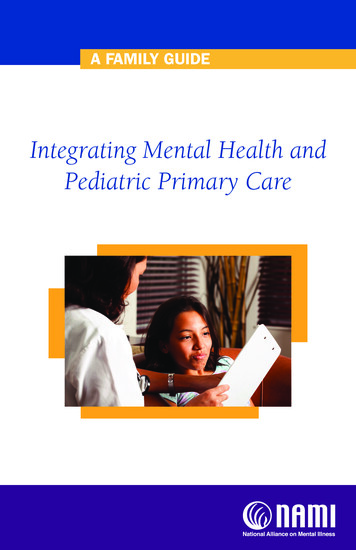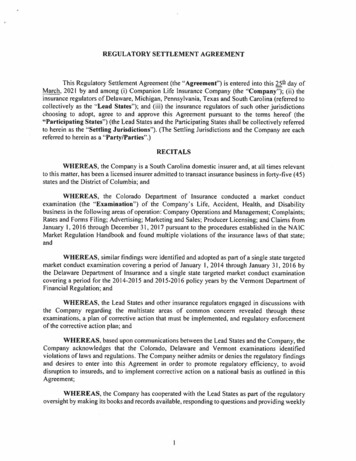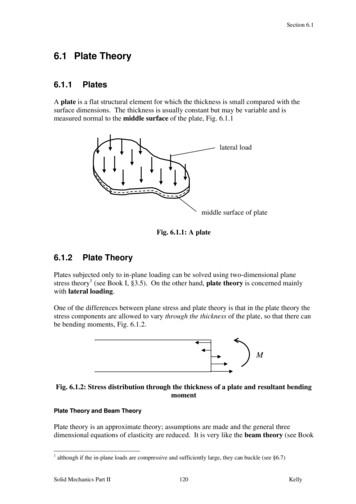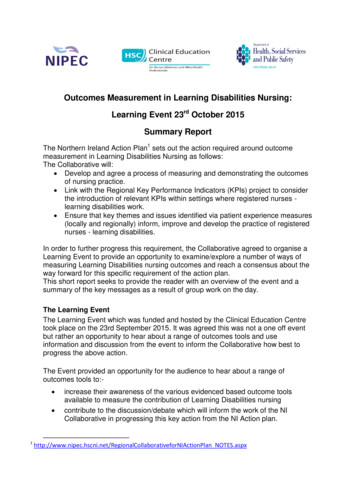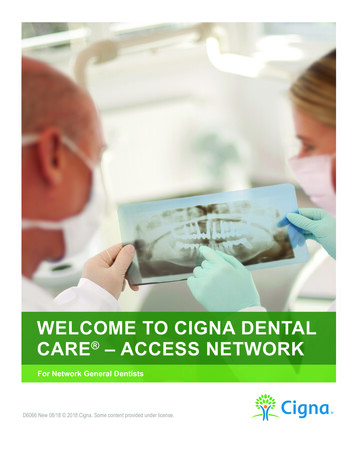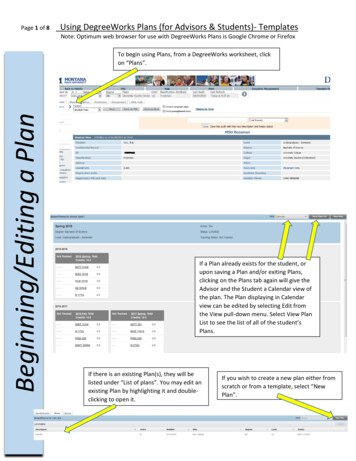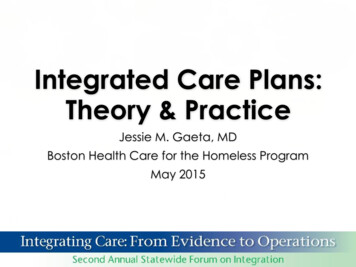
Transcription
Integrated Care Plans:Theory & PracticeJessie M. Gaeta, MDBoston Health Care for the Homeless ProgramMay 2015
Theory & Practice Theory Concise snapshot of current priorities of team, acrossdisciplines Intent is to better coordinate care among ALL providers Dynamic document – while overarching goals may persist,specific plans may change frequently Practice Culture shift, takes time Emphasize empowerment of all team members to changeplans Case conferencing is the best mechanism for generating aplan Make it front and center – don’t bury it in the note
The SPARK CenteratBoston Medical CenterTherapeutic childcare in a multidisciplinaryteam environment working in conjunctionwith primary and specialty care providers.Making community connections.
ProviderReferraltofeedbackFamily onAssessmentprocessCase review
SPARK children Medical issues such asVLBW infants, hypoxicbrain injury, seizuredisorders, respiratoryproblems, FTT, CP,ASD, cardiac defects,HIV, sickle cell, TBI Emotional/behavioralchallenges: Impairedself regulation, neglect,physical and/or sexualabuse, parental loss,DV, trauma Have complex,overlapping challenges Have needs that can’tbe met in other settings Are at highest risk forabuse/neglect Live in poverty
SPARK Team Educators - providetherapeutic,developmentallyappropriate classrooms forcontent and social skills. EI Coordinator - providesassessment, referrals,transitions to public school Psychology clinicians provide individual, familyand group therapy,educational testing, homevisits, development of careplans Nurses - provideassessment, healtheducation, direct care,care coordination,adherence support,emergency triage
Care PlansCommunity and home Respect for family values,priorities and cultures. Value each discipline’scontribution. Create communicationplan for follow up.Moving on to school Parental letter to requestevaluation. Testing happens at SPARKwith appropriate input. SPARK staff attends IEPmeeting. Contact with school staff asneeded.
Protecting Privacy Privacy policies consistent with BMC. HIPAA and permission forms signed onadmission and updated each September. All staff adhere to yearly employee trainingupdates related to confidentiality.
Case StudyNursingNutritionGather medical dataClassroom assistanceBehavioral HealthEducationAssessmentSmall therapeutic classroomBehavioral interventionplan1:1 ratioAssessment (education andsocial)Classroom assistanceDCF/Foster parentTeam meetingsBuy-in on “the plan”Communication
The SPARK Center255 River St.Mattapan, MA 02126Phone: 617-414-2050Fax :617-534-2057www.bmc.org/SPARKSupporting Parents And Resilient KidsPatient Progress ReportChild:Case Review Date :Current Age:DOB:Date of Enrollment:Nursing and Early Intervention:Provider InitialsDevelopmental/Classroom:Provider InitialsBehavioral Health:Provider InitialsFamily/Other:Provider Plan:Contacts:Karen Rogers Lynch, RN, Nursing Coordinator, 617-414-0505; Karen.Lynch@bmc.orgCatherine McCray-Manigault, Education Coordinator, 617-414-0509; Catherine.McCray-Manigault@bmc.orgMartha Vibbert, PhD, Mental Health Coordinator, 617-414-0501; mvibbert@bu.eduLeah Koretz, , 617-414-0517; Leah.Koretz@bmc.org
Behavioral Health Care ManagementFamily Medicine Center at Boston Medical CenterAlysa N. Veidis RN, MSN, FNP-BCMay 12, 20151
Patient Centered CarePCPMAPharm DPatientTeamNPNavigatorPatientTeamNursingLICSWBH NPPsychiatrist2
Care that is CoordinatedHighrisk:NPmanagedHospital d/cUncontrolled diseaseModerate risk:RN managed1-3 chronic diseasesLow risk:Medical Assistant/LPN managedPreventative care outreach33
Integrated Behavioral Health ModelCareManagementTeamCo-managementPCP/NP TeamsBehavioral Health TeamPatientNavigator ResourceexpertLICSW Crisis interventionShort coursepsychotherapy formoderate complexitypatientsSubstance use counselingGroup visitsFam Med RoundsNP Psychopharmacologyvisits Depression CareManagement Group Visits Ongoing therapy Fam Med RoundsPsychiatrist Directpatient care(high risk)ConsultLiaisonPCPeducationBH oversightIncreasing complexity of behavioral health need4
Care Note5
EMR Communication between LICSW and PCP6
Communication- multi-pronged approachMode of CommunicationDetail Warm Hand -OffsDaily and unscheduled Curbsides/ PagesAd- hoc and daily EMRProgress Notes, and messaging inCentricity with security lock All staff meetingWeekly Brief Updates and periodicagenda focus Monthly Team RoundsMonthly Flash Rounds HuddleDaily update on BH team schedule andavailability7
Concrete How To’sWorth It:1. Lay the Groundwork (“measure twice and cut once”)2. Don’t underestimate the power of cross-departmental collaboration3. Understand Behavioral Health Provider skill sets4. Strategically place BH providers in the clinic (between exam rooms)5. Understand billing and volume implications6. Train , train and train some more7. Communication and organization is KEY – you cannot over communicate!8. Involve all levels of staff9. Start small and spread10. Decide on measures of success early8
Nursing Nutrition Gather medical data Classroom assistance Education Small therapeutic classroom 1:1 ratio . Team meetings Buy-in on "the plan" Communication Behavioral Health Assessment Behavioral intervention plan Classroom assistance Case Study. The SPARK Center 255 River St. Mattapan, MA 02126 Phone: 617 - 414 - 2050 Fax : 617 - 534 .
